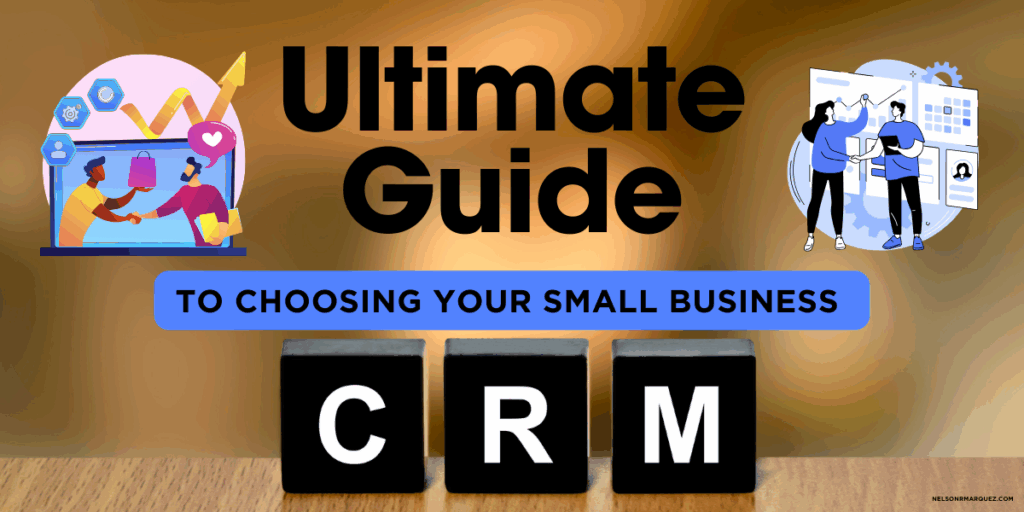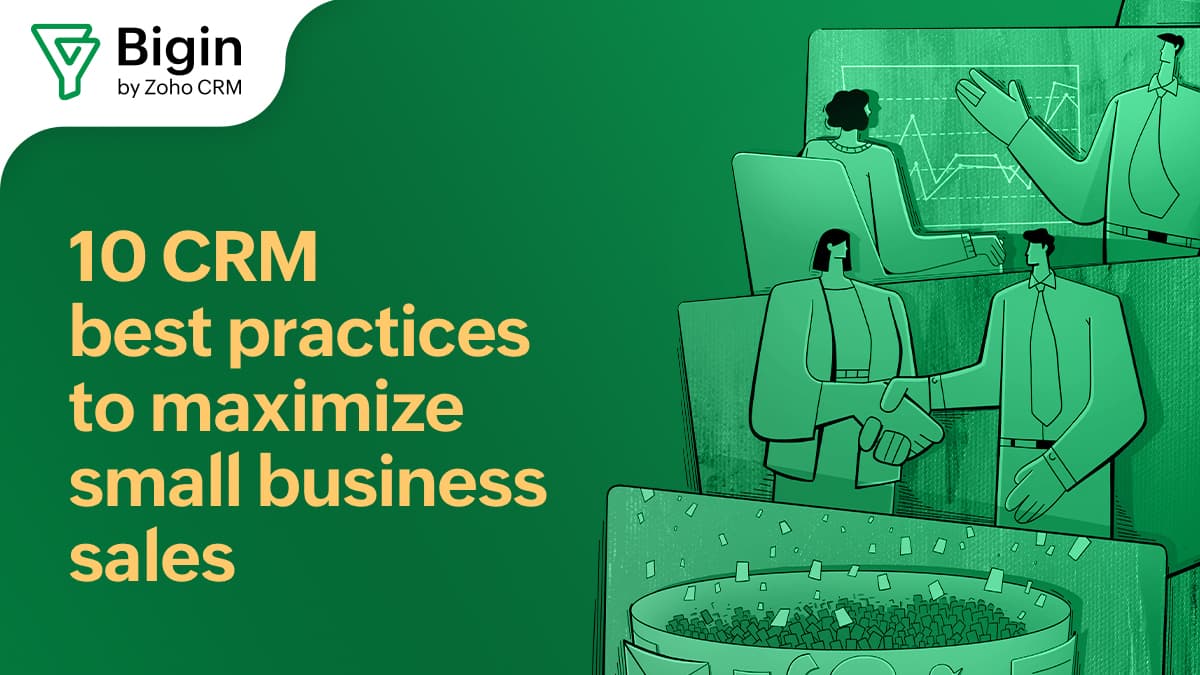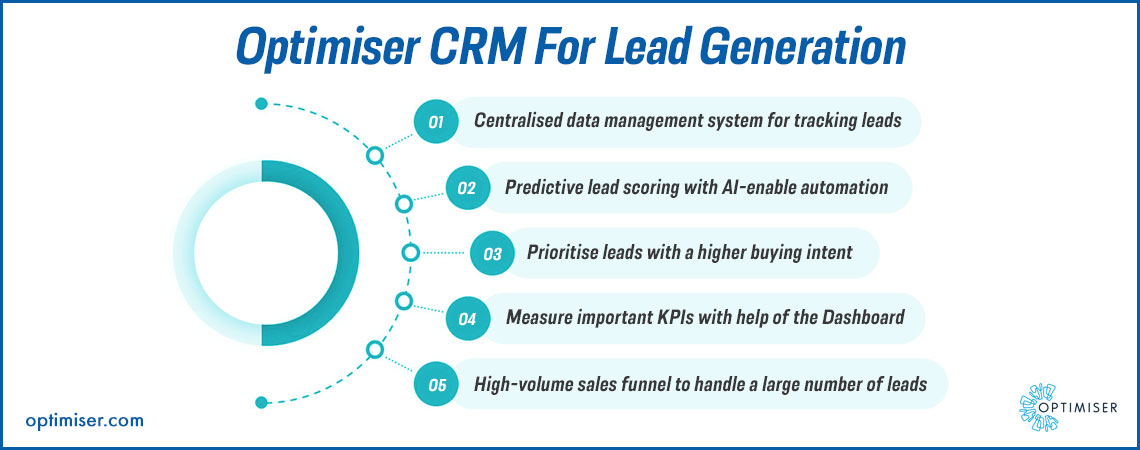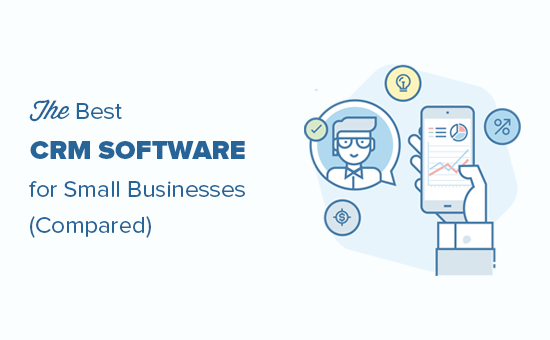The Ultimate Small Business CRM Guide: Boost Sales, Delight Customers, and Scale Your Company

The Ultimate Small Business CRM Guide: Boost Sales, Delight Customers, and Scale Your Company
Running a small business is a whirlwind. You’re juggling everything – from product development and marketing to customer service and finances. In the midst of it all, keeping track of your customer relationships can feel like an overwhelming task. That’s where a Customer Relationship Management (CRM) system comes in. This ultimate guide will walk you through everything you need to know about CRMs for small businesses, helping you streamline your operations, boost sales, and build lasting customer relationships.
What is a CRM? Understanding the Basics
At its core, a CRM is a system that manages your interactions with current and potential customers. It acts as a central hub for all your customer data, allowing you to track every interaction, from initial contact to post-sale support. Think of it as a digital Rolodex on steroids.
A CRM system typically includes features such as:
- Contact Management: Storing and organizing customer information like names, contact details, and company affiliations.
- Interaction Tracking: Logging every communication, including emails, phone calls, and meetings.
- Sales Automation: Automating sales processes like lead nurturing, quote generation, and follow-ups.
- Marketing Automation: Sending targeted marketing campaigns and tracking their performance.
- Reporting and Analytics: Providing insights into sales performance, customer behavior, and marketing effectiveness.
The benefits of using a CRM are numerous, especially for small businesses. It helps you stay organized, improve customer service, increase sales, and make data-driven decisions. Without a CRM, you’re essentially flying blind, relying on memory and scattered spreadsheets to manage your most valuable asset: your customers.
Why Your Small Business Needs a CRM
In today’s competitive landscape, customer experience is king. Customers expect personalized interactions and seamless service. A CRM helps you deliver on these expectations by providing a 360-degree view of each customer. Here’s why your small business can’t afford to ignore a CRM:
- Improved Customer Relationships: By understanding your customers better, you can tailor your interactions to their specific needs and preferences. This leads to happier customers and increased loyalty.
- Increased Sales: A CRM helps you identify and nurture leads, track sales opportunities, and close deals more efficiently. Sales automation features streamline your sales process, freeing up your time to focus on closing deals.
- Enhanced Productivity: Automating repetitive tasks like data entry and follow-up emails frees up your team’s time to focus on more strategic activities.
- Better Data Analysis: CRM systems provide valuable insights into your sales performance, customer behavior, and marketing effectiveness. This data allows you to make informed decisions and optimize your strategies for better results.
- Centralized Information: No more hunting through emails, spreadsheets, and sticky notes to find customer information. A CRM provides a single source of truth for all your customer data, ensuring everyone on your team has access to the same information.
- Scalability: As your business grows, a CRM can scale with you. It can handle increasing volumes of data and users, ensuring your customer relationship management system grows alongside your business.
Imagine the difference a CRM can make. Instead of spending hours manually entering data, your team can focus on engaging with customers and closing deals. Instead of guessing which marketing campaigns are working, you can see the exact ROI of each campaign. A CRM is an investment that pays off by streamlining your operations, improving customer satisfaction, and driving revenue growth.
Choosing the Right CRM for Your Small Business
With so many CRM options available, choosing the right one can feel daunting. The key is to find a system that aligns with your specific business needs and budget. Here’s a step-by-step approach to help you make the right choice:
1. Define Your Needs and Goals
Before you start evaluating CRM systems, take some time to understand your business requirements. What are your primary goals for implementing a CRM? Are you focused on improving sales, enhancing customer service, or streamlining marketing efforts? Consider these questions:
- What are your current customer relationship challenges? Are you struggling with disorganized data, inefficient sales processes, or poor customer service?
- What features are essential for your business? Do you need contact management, sales automation, marketing automation, or reporting capabilities?
- How many users will need access to the CRM? This will impact the pricing and scalability of the system.
- What is your budget? CRM pricing varies widely, so determine how much you’re willing to spend.
- Do you need any integrations with other tools? Consider your existing software, such as email marketing platforms, accounting software, and e-commerce platforms.
Answering these questions will help you create a clear picture of your CRM needs and guide your selection process.
2. Research CRM Providers
Once you know your needs, it’s time to research different CRM providers. Here are some popular options for small businesses:
- HubSpot CRM: A free, user-friendly CRM with robust features for sales, marketing, and customer service. It’s a great option for businesses of all sizes.
- Zoho CRM: A comprehensive CRM with a wide range of features, including sales automation, marketing automation, and customer support tools. It offers a free plan and affordable paid plans.
- Salesforce Sales Cloud: A powerful CRM that’s popular among larger businesses, but it can also be suitable for small businesses with complex needs. It offers a wide range of features and customization options.
- Pipedrive: A sales-focused CRM that’s known for its simplicity and ease of use. It’s a great option for businesses that prioritize sales efficiency.
- Freshsales: An AI-powered CRM with features for sales automation, lead management, and customer engagement.
When researching providers, consider the following factors:
- Features: Does the CRM offer the features you need, such as contact management, sales automation, and marketing automation?
- Ease of Use: Is the CRM user-friendly and easy to learn? A complicated system will be difficult for your team to adopt.
- Pricing: Does the CRM fit within your budget? Consider the cost per user and any additional fees.
- Integrations: Does the CRM integrate with your existing software, such as email marketing platforms and accounting software?
- Customer Support: Does the provider offer reliable customer support?
- Reviews: Read reviews from other small businesses to get an idea of the CRM’s strengths and weaknesses.
3. Evaluate and Compare
Once you’ve identified a few potential CRM providers, it’s time to evaluate and compare them. Create a spreadsheet or document to track the features, pricing, and pros and cons of each system. Consider the following:
- User Interface: Is the CRM’s interface intuitive and easy to navigate?
- Customization Options: Can you customize the CRM to meet your specific needs?
- Reporting Capabilities: Does the CRM offer the reports and analytics you need to track your performance?
- Mobile Access: Does the CRM have a mobile app or provide mobile access?
- Security: Does the CRM offer adequate security measures to protect your customer data?
- Free Trials: Many CRM providers offer free trials, so take advantage of them to test the system before you commit.
4. Choose and Implement
After evaluating the options, choose the CRM that best fits your needs and budget. Before you begin implementation, develop a detailed implementation plan. This plan should include the following steps:
- Data Migration: Migrate your existing customer data from spreadsheets or other systems to the new CRM.
- User Training: Train your team on how to use the CRM. Provide clear instructions and ongoing support.
- Customization: Customize the CRM to meet your specific needs, such as adding custom fields and creating workflows.
- Integration: Integrate the CRM with your other software, such as email marketing platforms and accounting software.
- Testing: Test the CRM thoroughly to ensure it’s working correctly.
- Ongoing Support: Provide ongoing support to your team and monitor the CRM’s performance.
Implementation can take time, so be patient and allocate sufficient resources to the process.
Essential CRM Features for Small Businesses
While every business has unique needs, some CRM features are essential for small businesses. These features will help you streamline your operations, improve customer relationships, and drive sales.
- Contact Management: This is the foundation of any CRM. It allows you to store and organize customer information, including names, contact details, company affiliations, and notes.
- Lead Management: This feature helps you track and nurture leads throughout the sales pipeline. It allows you to capture lead information, qualify leads, and assign them to sales representatives.
- Sales Automation: Automate repetitive sales tasks, such as sending follow-up emails, scheduling appointments, and generating quotes. This frees up your sales team’s time to focus on closing deals.
- Deal Tracking: Track your sales opportunities and monitor their progress through the sales pipeline. This allows you to identify potential bottlenecks and improve your sales forecasting.
- Reporting and Analytics: Generate reports on your sales performance, customer behavior, and marketing effectiveness. This data allows you to make informed decisions and optimize your strategies.
- Email Integration: Integrate your CRM with your email platform to track email interactions with customers and send targeted email campaigns.
- Mobile Access: Access your CRM data on the go with a mobile app or mobile-friendly interface. This allows your team to stay connected with customers and manage their activities from anywhere.
- Task Management: Manage tasks and set reminders to ensure your team stays on track and follows up with customers promptly.
- Workflow Automation: Automate repetitive tasks and processes, such as sending welcome emails to new customers or assigning leads to sales representatives.
- Integration with Other Tools: Integrate your CRM with your other software, such as email marketing platforms, accounting software, and e-commerce platforms.
These features will help you manage your customer relationships effectively, improve your sales performance, and streamline your operations.
Maximizing Your CRM: Best Practices for Small Businesses
Implementing a CRM is only the first step. To get the most out of your CRM, you need to adopt best practices that ensure its effective use and maximize its value. Here are some tips for success:
- Data Entry and Accuracy: Ensure your data is accurate and up-to-date. Inaccurate data can lead to poor customer service and missed opportunities.
- Training and Adoption: Provide adequate training to your team on how to use the CRM. Encourage adoption by highlighting the benefits and providing ongoing support.
- Regular Data Cleanup: Regularly clean up your data by removing outdated information and correcting errors.
- Use Automation Wisely: Automate repetitive tasks to save time and improve efficiency, but avoid over-automating, which can lead to impersonal interactions.
- Personalize Your Interactions: Use the CRM to personalize your interactions with customers. Tailor your communication to their specific needs and preferences.
- Track Key Metrics: Track key metrics, such as sales conversion rates, customer satisfaction scores, and customer lifetime value, to measure the CRM’s effectiveness.
- Integrate with Other Tools: Integrate your CRM with your other software to streamline your workflow and improve data visibility.
- Regularly Review and Optimize: Regularly review your CRM usage and make adjustments as needed. Optimize your workflows and processes to improve efficiency and effectiveness.
- Focus on Customer Experience: Use your CRM to enhance the customer experience. Provide excellent customer service and build strong relationships.
- Get Feedback from Your Team: Gather feedback from your team on how they use the CRM and identify areas for improvement.
By following these best practices, you can ensure your CRM becomes a valuable asset for your small business.
Common Challenges and How to Overcome Them
While CRM systems offer significant benefits, small businesses may encounter some challenges during implementation and use. Here’s how to overcome them:
- Lack of User Adoption: One of the biggest challenges is getting your team to adopt the CRM. To overcome this, provide thorough training, highlight the benefits, and make the system easy to use.
- Data Migration Issues: Migrating data from existing systems can be complex. To avoid problems, plan the migration carefully, clean up your data before migrating, and test the data after migration.
- Data Accuracy Problems: Inaccurate data can undermine the value of your CRM. To address this, implement data validation rules, train your team on data entry best practices, and regularly clean up your data.
- Integration Challenges: Integrating your CRM with other software can be challenging. To overcome this, choose a CRM that integrates well with your existing systems and seek help from the CRM provider or a consultant if needed.
- Cost Concerns: CRM systems can be expensive. To manage costs, choose a CRM that fits your budget and consider starting with a basic plan and upgrading as your needs grow.
- Lack of Time and Resources: Implementing and managing a CRM requires time and resources. To address this, allocate sufficient time and resources to the project and prioritize the most important features.
By anticipating these challenges and taking proactive steps to address them, you can minimize the impact and ensure a successful CRM implementation.
The Future of CRM for Small Businesses
The CRM landscape is constantly evolving. As technology advances, CRM systems are becoming more sophisticated and user-friendly. Here are some trends to watch for:
- Artificial Intelligence (AI): AI is being integrated into CRM systems to automate tasks, personalize customer interactions, and provide predictive insights.
- Mobile CRM: Mobile CRM apps are becoming more feature-rich, allowing sales and support teams to access CRM data and manage their activities on the go.
- Increased Integration: CRM systems are integrating with more and more third-party applications, such as social media platforms, e-commerce platforms, and marketing automation tools.
- Focus on Customer Experience: CRM systems are increasingly focused on providing a seamless and personalized customer experience.
- Data Privacy and Security: Data privacy and security are becoming increasingly important, and CRM providers are investing in robust security measures to protect customer data.
Small businesses that embrace these trends will be well-positioned to thrive in the future. By staying informed about the latest CRM developments, you can ensure your business is leveraging the most effective tools and strategies.
Conclusion: Embrace CRM for Small Business Success
A CRM system is a powerful tool for small businesses looking to improve customer relationships, increase sales, and streamline operations. By understanding the basics of CRM, choosing the right system, and adopting best practices, you can transform your business and achieve sustainable growth.
Don’t let the complexity of managing customer relationships hold you back. Embrace the power of CRM and unlock the full potential of your small business. The investment in a well-chosen and properly implemented CRM system is an investment in your future success. Start today, and watch your business flourish!




